Embue Cacao on paper has a lot of great qualities but some unforgivable. They are apart of a couple non-profits and they promote connecting with cacao in a spiritual manner. They have one major glaring issue that does not sit well with me. Embue maliciously downplays the importance of Prop 65 to their customers about the dangers of their the heavy metal content in their chocolate, of which is, in my opinion, dangerously high. If they were transparent about it I could probably give them a cautious recommendation, but they write a scathing manifesto about why we shouldn’t trust regulations, something the holistic community often propagates. Embue probably has decent quality cacao, but the owners make me a bit skeptical to support them with how much they downplay their heavy metal content. But let’s give them a fair assessment below.
Company Background
Embue Cacao, previously named Heartblood Cacao, underwent a name change around 2021. Perhaps the name was a bit too visceral for customers. Embue Cacao is a family business owned by a husband and wife, though only the husband, Moses, makes public appearances. Moses also has his own spiritual private practice on the side, too. The company is headquartered in Guildford, Vermont; a town not too far from where I grew up. For those that don’t know, Vermont used to be known for its hippie culture long ago so while I’m not surprised to see a ceremonial cacao company operate from there, I’m still pleasantly surprised to see Vermont mentioned.
The company was formed through an experience when the owners traveled to Costa Rica and were offered a ceremonial cacao event with a group of strangers. For whatever reason, chocolate water really got the owners mystified. They boldly claim they are why ceremonial cacao started becoming popular in New England. I can’t verify the veracity of this claim, but I find it quite speculative. The entire premise of Embue Cacao is how cacao has medicinal properties. While I agree cacao has some fantastic health benefits, I’d never go so far as to call it medical. Medicine is medicine, cacao is just a fruit (albeit a tasty one).
Social Responsibility
Though Embue Cacao got the idea in Costa Rica, they operate entirely out of Guatemala while recently partnering with the non-profit, AIR Guatemala. A nice gesture that I can appreciate. I researched AIR Guatemala and they are a solid non-profit focusing on reforestation and regenerative farming methods in Central America. In 2020, Embue Cacao released an “Impact Report” that shared some of their accolades as a cacao shop but nothing since then. They are also members of 1% For the Planet foundation. I verified this myself as I have trust issues with this company.

Guatemalan Cacao
Embue is quite transparent about where their cacao comes from. In this case, it’s the Laguna Lachua region in north-central Guatemala. On Embue’s site, they even go as far as saying the region was home to the Q’eqchi’ Mayan natives that harvested cacao long ago. I researched the Q’eqchi’ people and it’s quite tragic, having lost most of their culture and people during the Spanish conquest of Central America.
Embue states they pay far above farmgate prices allowing for the farmers to earn a decent living but no prices are mentioned. The farming process from bean to bar is documented on their site so we can see each step. They also claim their chocolate is “well fermented” by the FCCI protocol. Many companies claim this, but I need to see some documentation confirming it. I don’t disbelieve Embue (actually I do), but I need to see it to believe it. There are images documenting how the cacao is processed in Guatemala but there’s no info on the farmers themselves or the cooperative Embue works with as a supplier.
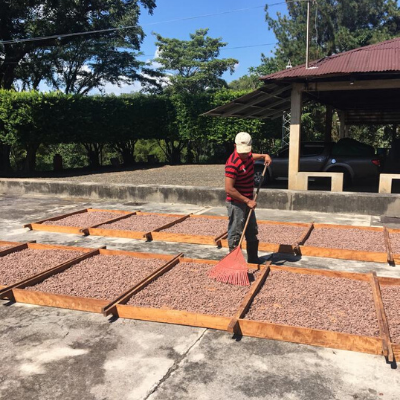
From what their site and blogs claim, they only process the cacao themselves once it enters Vermont where they roast, grind, and package the chocolate. This is pretty standard and doesn’t affirm to me that they have total control of their supply chain. Since they don’t mention a supplier, but they do state that they work with a chocolate maker in Guatemala, that tells me they use a cooperative but do not disclose which one. Not usually a deal breaker, but it’d be nice to see more about the supply side of the cacao.
Addressing the Elephant in the Room (Heavy Metal Testing Deceitfulness)
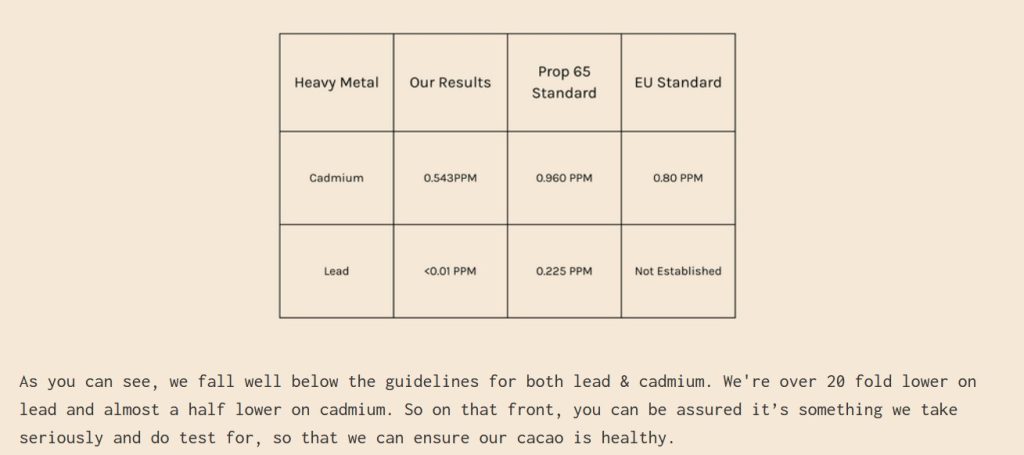
Disclaimer: 1 ppm = 1mcg (e.g. 0.960 ppm = 0.960mcg) so I will be converting all ppm to mcg for consistency.
Here’s where things become unforgivable. First, Embue doesn’t actually share their test results which hurts their image, for me anyway. They simply tell us the numbers and hope we believe it.
Second, the other suspicious behavior is they show the PPM for chocolate but use weird metaphors instead of explaining what it really means. I’ll tell you, though. PPM means parts per million and simply it’s a 1:1 ratio to micrograms (mcg). To make it simpler, there’s 1mcg for ever gram of product.
Keep in mind Prop 65 states that the Maximum Allowable Dose Levels (MADL) are 4.1mcg for cadmium and .5mcg for lead.
The above image shows Embue Cacao at 0.543ppm, but what it’s really saying is there’s 0.543mcg of cadmium for every gram of chocolate. While yes, it’s technically half of what Proposition 65 requires before needing a warning label (.960ppm), it’s still a very high number. Actually, the Superior Court of California was far too generous on how much contamination can be in chocolate without a label, giving many companies too much room for contamination.
Since we know 4.1mcg is the daily recommended limit set by Prop 65, and Embue Cacao contains 0.543mcg per gram of chocolate, their 85g chocolate bars contains a total of 46.16mcg of cadmium per bar. That’s 11x over the safe limit of Prop 65’s limit of cadmium per day. However, their chocolate bars have three “servings“, so you can divide the cadmium level by three which is just over 15mcg of cadmium per serving… This is egregiously dangerous and maliciously misleading and sits nearly 4x over your recommended daily limits. YIKES.
You can only safely consume 7.5 grams of Embue Cacao before reaching your daily limit of cadmium. Their chocolate bars are a whopping 85 grams, or three ounces. That amounts to less than 10% of their bar a day and that’s not accounting for your normal diet which will have cadmium and lead in it too.
To give you an idea of what an acceptable PPM level is, it should be around 0.100-0.150mcg, not 0.543mcg which is already five times what we should be aiming for. The audacity of Embue Cacao boasting their “low” levels while being so riddled with cadmium is an incredibly dangerous misdirection of the potential health concerns of their chocolate and shows their “holistic” image exists only to exploit you.
Highly unethical business practice coming from a company that prides itself on high quality cacao and spiritually connecting with it. However, this is a very common theme among holistic practitioners and exactly the reason I am bringing transparency to these companies.
Does “Ceremonial Cacao” Mean Anything?
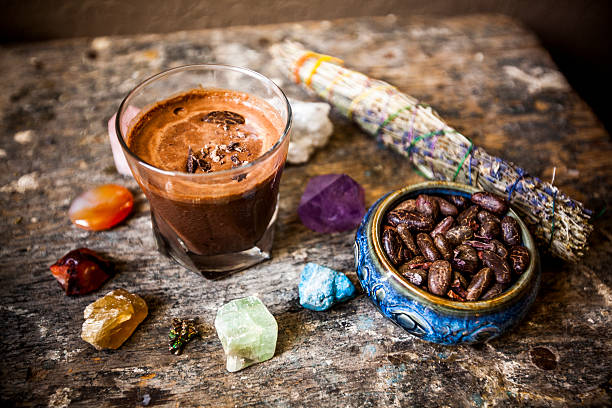
Embue Cacao sells what is known as “ceremonial cacao”. If you’re not familiar with ceremonial cacao, then it’s easy to be persuaded into overspending on it; not that it’s not worth the price when the quality is justified, just not in this case. In short, ceremonial cacao is an unregulated self-label to simply mean very high quality chocolate, usually 100% cacao with zero additives. Ceremonial cacao is often consumed as a beverage via ground cacao but can be eaten in bar form.
Now that you’re an expert in ceremonial cacao, let’s get back to Embue. This company heavily focuses on the more spiritual side of cacao and treats it as a holistic experience and less of a consumer product. It’s not my thing but live and let live. They even offer expensive courses on cacao ceremony training and coaching (whatever that means). These classes are quite expensive, ranging to the hundreds of dollars for a few sessions for a spiritual connection to what is essentially chocolate water.
Again, I have no issue with the idea of connecting with one’s inner self, but I am always incredibly skeptical of these paid services–of which after some research there are many similar to Embue. If you were to ask me, you could easily pull up a myriad of videos for free on YouTube from the indigenous or locals unique to that region that do hold these ceremonies sacred and learn from them. This doesn’t affect my position on Embue’s quality.
Embue is certified organic, but as seen with many of these companies, that means nothing. The certification process for being organic is expensive so many companies may actually be organic without the label. Organic can be a great indicator of quality, but it can also mean nothing if the company only meets the bare requirements for the label.
Final Thoughts
After digging around, I found their toxic heavy metal test results along with the scathing manifesto about not trusting regulations, a gimmick since forever that the holistic community cannot break free from. Their cacao has absurdly high cadmium content, so it makes sense why they mislead their customers about the numbers. It’s not forgivable no matter how much they give back to the community.
I’d like to learn more about Embue Cacao’s cacao supplier too. There could be more to this story than what Embue Cacao is telling us, and by giving us the name of the cooperative they work with then we could do our own research. But that information is not available.
I could understand a company not aware of the whole heavy-metal-in-chocolate problem as it’s not something most people think about. But their extensive page discrediting regulators from trying to keep the general public safe is not only a red flag but is a malicious attempt to get you to buy their chocolate. If their statement acknowledged the concerning cadmium content and they are working to reduce the contamination, then I’d be more accepting of them. What this tells me is they have no control over the first half of the supply chain, and they are at the mercy of the suppliers/cooperative and are conducting damage control for people like me (it only made it worse).
With all that said, for purposely misleading the public to hide dangerous heavy metal numbers, Embue Cacao is not recommended by me.

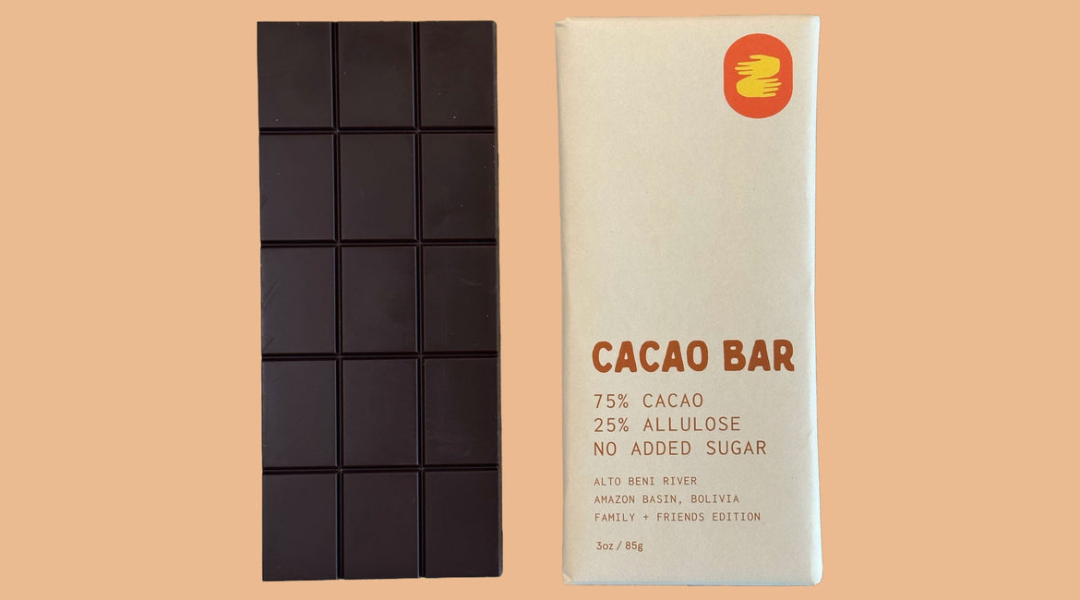


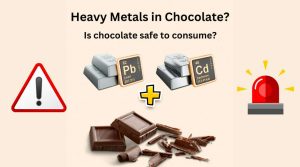
I found your site because I drink ceremonial grade cacao and am always wanting to learn more. One thing about ceremonial grade cacao is that even though it comes in a bar, it is typically many, many “doses”. For example, the chocolate dose mixed with water to create the drink is approx 1/8 to 1/4 the size of cup of coffee. Is it possible you’re assuming the bar is one serving but it’s actually much more?
The Embue chocolate bar is meant to be consumed as a snack, not to be confused with their block chocolate for brewing. But the metal quantity will be higher in their ceremonial cacao as it’s pure cacao and now cut with sweeteners.